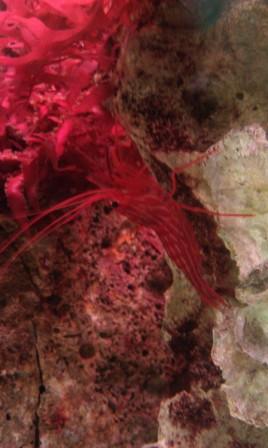
Red rock shrimp
It’s almost Valentine’s Day! The perfect time to highlight a red ocean critter: the red rock shrimp or Lysmata californica.
In Southern California, the red rock shrimp plays an important cleaning role, removing parasites from moray eels and California spiny lobsters. Parasite removal doesn’t sound like a great gig, but it’s not so bad if you like to eat parasites! Since both animals benefit from this type of relationship, it’s officially called mutualistic, the red rock shrimp scores dinner and moray eels and other fish benefit from having fewer parasites hanging around.
Red rock shrimp are pretty tiny, less than three inches long. The perfect size for swiftly moving along other larger animals cleaning away as they go. They live along the coast in shallow waters and rocky shores to as deep as 200 feet.
But cleaning much larger animals can be dangerous. According to the panel on red rock shrimp at Cabrillo Marine Aquarium, “this part-time occupation provides food, but not without risk, as evidenced by the large number of cleaner shrimp in the stomach of morays.” Someone needs to add cleaning moray eels to the list of high-risk jobs!
There are many different species of cleaner shrimp found throughout the oceans of the world. One cleaner shrimp played a comedic role in “Finding Nemo,” Jacques, the shrimp living in the tank at the dentist’s office. According to Wikipedia, Jacques is a Pacific cleaner shrimp or Lysmata amboinensis and plays an important role in reef ecosystems.
A big shout out to all the cleaner shrimp out there! Thanks for keeping other animals healthy despite the risks. (For better photos of the red rock shrimp, check out this website Ocean Light. It’s hard to tell in my photo, but the red rock shrimp has really cool stripes.)
So this would be a case of Red Rock West!
Who knew such a small creature brings so much benefit to the ecosystem, and while taking risks! It’s like when I found out how beneficial Pacific salmon are especially when returning to the place where they were born. If only the whole world knew how fascinating wildlife is maybe they would care more.